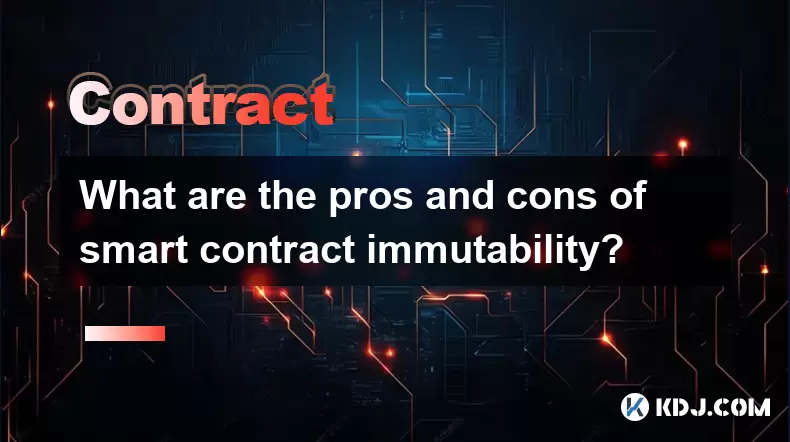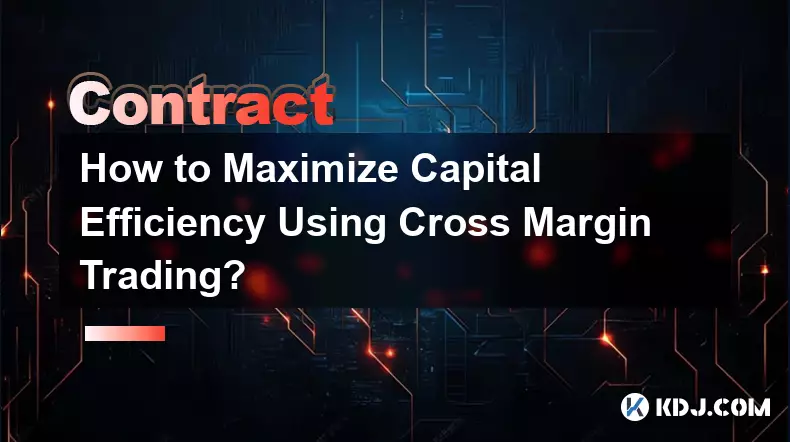-
 bitcoin
bitcoin $87959.907984 USD
1.34% -
 ethereum
ethereum $2920.497338 USD
3.04% -
 tether
tether $0.999775 USD
0.00% -
 xrp
xrp $2.237324 USD
8.12% -
 bnb
bnb $860.243768 USD
0.90% -
 solana
solana $138.089498 USD
5.43% -
 usd-coin
usd-coin $0.999807 USD
0.01% -
 tron
tron $0.272801 USD
-1.53% -
 dogecoin
dogecoin $0.150904 USD
2.96% -
 cardano
cardano $0.421635 USD
1.97% -
 hyperliquid
hyperliquid $32.152445 USD
2.23% -
 bitcoin-cash
bitcoin-cash $533.301069 USD
-1.94% -
 chainlink
chainlink $12.953417 USD
2.68% -
 unus-sed-leo
unus-sed-leo $9.535951 USD
0.73% -
 zcash
zcash $521.483386 USD
-2.87%
What are the pros and cons of smart contract immutability?
Smart contract immutability ensures trust and security by making deployed code unchangeable, but it also limits flexibility and complicates error correction.
Jul 15, 2025 at 11:43 pm

Understanding Smart Contract Immutability
Smart contract immutability refers to the characteristic of blockchain-based contracts that once deployed on a distributed ledger, they cannot be altered or deleted. This feature is central to the design philosophy of many decentralized applications (dApps) and underpins the trustless nature of blockchain technology. The code and data stored on the blockchain remain permanent and tamper-proof, ensuring transparency and integrity.
This immutability stems from the consensus mechanisms used in blockchain networks like Ethereum. When a smart contract is deployed, it becomes part of the blockchain’s state, and any changes would require altering all subsequent blocks, which is computationally infeasible without network-wide agreement.
Advantages of Smart Contract Immutability
One of the most significant benefits of immutable smart contracts is their ability to eliminate third-party interference. Because no one can modify the contract after deployment, users are assured that the rules encoded will be executed exactly as intended. This fosters trust among participants who may not know or trust each other.
Another major advantage is enhanced security against unauthorized modifications. Since the contract's logic is fixed, attackers cannot exploit vulnerabilities by changing the code post-deployment. This makes it easier to audit and verify the contract's behavior before launch.
Immutable smart contracts also provide legal enforceability through code. In traditional legal systems, disputes often arise due to ambiguous language or manipulation of records. With smart contracts, the terms are written in unchangeable code, reducing the potential for fraud or misinterpretation.
Additionally, immutability contributes to long-term reliability and predictability. Developers and users can rely on the consistent execution of contract functions over time, which is crucial for financial instruments, governance protocols, and supply chain solutions built on blockchain platforms.
Disadvantages of Smart Contract Immutability
Despite its strengths, immutability introduces several challenges. One of the primary drawbacks is the inability to fix bugs or vulnerabilities after deployment. If a flaw exists in the contract code, it remains exploitable indefinitely. High-profile incidents such as the DAO hack on Ethereum have demonstrated how critical this issue can be.
Another limitation is the lack of flexibility in updating contract logic. Business requirements evolve, and being unable to upgrade a contract can hinder adaptability. While proxy patterns and modular designs attempt to address this, they add complexity and may introduce new attack surfaces.
Immutable contracts also pose challenges for regulatory compliance. Legal frameworks often require the ability to correct errors, respond to court orders, or comply with evolving regulations. Smart contracts, however, do not allow retroactive changes, making them difficult to align with certain jurisdictional expectations.
Furthermore, the absence of a rollback mechanism can lead to irreversible consequences. Mistakes made during contract execution—such as incorrect fund transfers or unintended token minting—cannot be undone, potentially causing significant financial losses.
Mitigation Strategies and Workarounds
To address some of the downsides of immutability, developers employ various strategies. One common approach is the use of proxy contracts. These act as intermediaries between users and the main contract, allowing upgrades to the underlying logic while maintaining the same contract address.
Another technique involves modular contract architecture, where different components of a system are separated into distinct contracts. This enables selective updates to specific modules without compromising the entire system’s integrity.
Some platforms implement governance tokens and decentralized autonomous organizations (DAOs) to manage contract upgrades collectively. Token holders vote on proposed changes, ensuring community-driven decision-making while preserving decentralization.
Developers also adopt rigorous pre-deployment testing and formal verification methods. By simulating contract behavior and mathematically proving correctness, teams reduce the likelihood of deploying flawed code.
Finally, off-chain storage solutions are employed to store mutable data outside the blockchain while keeping references on-chain. This allows for greater flexibility in managing dynamic information without sacrificing immutability for core contract logic.
Real-World Implications and Use Cases
In finance, immutable smart contracts enable trustless lending and borrowing platforms. Protocols like Aave and Compound rely on immutability to ensure that interest rates, collateral requirements, and repayment terms are enforced transparently and consistently.
In supply chain management, these contracts support transparent and auditable tracking systems. Each transaction recorded on the blockchain provides an immutable history of product movement, enhancing traceability and accountability.
Decentralized identity systems benefit from immutability by offering secure and persistent digital credentials. Users can prove ownership of identities or assets without relying on centralized authorities, reducing the risk of identity theft or forgery.
For governance, immutable smart contracts facilitate decentralized voting and proposal mechanisms. Community decisions are encoded and executed automatically, preventing tampering and ensuring democratic participation.
However, sectors requiring frequent policy updates or error corrections must carefully evaluate whether immutability aligns with their operational needs.
Frequently Asked Questions
- Can smart contracts ever be changed after deployment?While base-level smart contracts cannot be altered once deployed, workarounds like proxy contracts and modular architectures allow for functional upgrades without modifying the original code.
How does immutability affect user trust in DeFi platforms?Immutability enhances trust by ensuring that platform rules remain unchanged, fostering confidence that funds and transactions will behave as expected without hidden manipulations.
What happens if a bug is found in an immutable smart contract?If a vulnerability exists, it cannot be patched directly. Developers may deploy a new version and migrate users, but existing balances or locked funds could be at risk depending on the severity of the flaw.
Are there legal implications of using immutable contracts?Yes, legal systems typically expect the ability to rectify mistakes or enforce rulings. Immutable contracts can conflict with these expectations, leading to potential regulatory and compliance challenges. Disclaimer:info@kdj.com
The information provided is not trading advice. kdj.com does not assume any responsibility for any investments made based on the information provided in this article. Cryptocurrencies are highly volatile and it is highly recommended that you invest with caution after thorough research!
If you believe that the content used on this website infringes your copyright, please contact us immediately (info@kdj.com) and we will delete it promptly.
- Butuo County Puts the Brakes on Virtual Currency Mining: Sichuan's Latest Crackdown
- 2026-02-05 15:55:01
- Beyond the Neon Glow: Ethereum Casinos Set New Standards for Fair Play, Fees, and Speed
- 2026-02-05 15:30:07
- CME Group Navigates Crypto Tides: Own Coin, 24/7 Trading Amidst Market's Reckoning
- 2026-02-05 16:05:01
- Bitcoin Faces Liquidity Test Amid Shifting Institutional Support Landscape
- 2026-02-05 13:05:01
- Volkswagen Tayron R-Line 7-Seater: A New Era of Luxury Family SUV Hits India
- 2026-02-05 13:00:01
- AI, Crypto Bounties, and Human Labor: The Shifting Landscape of Work
- 2026-02-05 13:00:01
Related knowledge

How to Manage Emotions and "Revenge Trading" in Futures?
Feb 05,2026 at 12:19am
Understanding Emotional Triggers in Futures Markets1. Market volatility directly impacts psychological states, often amplifying fear or euphoria based...

How to Use Candle Close Confirmation for Futures Entry?
Feb 05,2026 at 04:20pm
Understanding Candle Close Confirmation1. A candle close confirmation occurs when the final price of a candlestick settles beyond a predefined level, ...

How to Analyze Market Sentiment Using the Fear and Greed Index?
Feb 05,2026 at 07:40am
Understanding the Fear and Greed Index1. The Fear and Greed Index is a composite metric designed to quantify prevailing emotional states among cryptoc...

How to Use Volume Profile to Find Key Futures Entry Levels?
Feb 04,2026 at 11:39pm
Understanding Volume Profile Structure1. Volume Profile displays the distribution of traded volume at specific price levels over a defined time period...

How to Trade Bitcoin Futures with 100x Leverage? (High-Risk Setup)
Feb 05,2026 at 11:00am
Understanding Bitcoin Futures Mechanics1. Bitcoin futures contracts represent agreements to buy or sell BTC at a predetermined price and date in the f...

How to Maximize Capital Efficiency Using Cross Margin Trading?
Feb 05,2026 at 12:40am
Cross Margin Trading Fundamentals1. Cross margin trading allows traders to use their entire account balance as collateral for open positions across mu...

How to Manage Emotions and "Revenge Trading" in Futures?
Feb 05,2026 at 12:19am
Understanding Emotional Triggers in Futures Markets1. Market volatility directly impacts psychological states, often amplifying fear or euphoria based...

How to Use Candle Close Confirmation for Futures Entry?
Feb 05,2026 at 04:20pm
Understanding Candle Close Confirmation1. A candle close confirmation occurs when the final price of a candlestick settles beyond a predefined level, ...

How to Analyze Market Sentiment Using the Fear and Greed Index?
Feb 05,2026 at 07:40am
Understanding the Fear and Greed Index1. The Fear and Greed Index is a composite metric designed to quantify prevailing emotional states among cryptoc...

How to Use Volume Profile to Find Key Futures Entry Levels?
Feb 04,2026 at 11:39pm
Understanding Volume Profile Structure1. Volume Profile displays the distribution of traded volume at specific price levels over a defined time period...

How to Trade Bitcoin Futures with 100x Leverage? (High-Risk Setup)
Feb 05,2026 at 11:00am
Understanding Bitcoin Futures Mechanics1. Bitcoin futures contracts represent agreements to buy or sell BTC at a predetermined price and date in the f...

How to Maximize Capital Efficiency Using Cross Margin Trading?
Feb 05,2026 at 12:40am
Cross Margin Trading Fundamentals1. Cross margin trading allows traders to use their entire account balance as collateral for open positions across mu...
See all articles























![KING vs PAINIFY😳 (1v1 ZONEWARS) [FORTNITE TOKEN/WAGER] KING vs PAINIFY😳 (1v1 ZONEWARS) [FORTNITE TOKEN/WAGER]](/uploads/2026/02/05/cryptocurrencies-news/videos/origin_6984035326d58_image_500_375.webp)
![2/4 [U.S. Hot Search] CIA: Xi Jinping is a paranoid | Xi Jinping’s two phone calls | Shandong’s “Internet-addicted” teenagers rebelled against tyranny | A direct attack on the Chengdu hacker national team | Why GDP must grow by 5% | The bridge under construction by the China Railway 12th Bureau collapsed | Thousands of billions of dollars spent abroad and thirty billion domestic subsidies | 2/4 [U.S. Hot Search] CIA: Xi Jinping is a paranoid | Xi Jinping’s two phone calls | Shandong’s “Internet-addicted” teenagers rebelled against tyranny | A direct attack on the Chengdu hacker national team | Why GDP must grow by 5% | The bridge under construction by the China Railway 12th Bureau collapsed | Thousands of billions of dollars spent abroad and thirty billion domestic subsidies |](/uploads/2026/02/05/cryptocurrencies-news/videos/origin_69840a757417b_image_500_375.webp)

















































